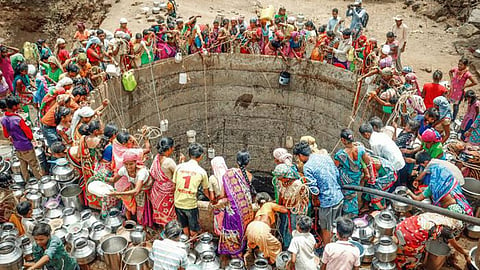The pandemic has had a devastating effect, a pushback to progress made over several decades. The number of lives lost and lives wasted, consequent to the pandemic’s impact on all major socioeconomic indicators, has caused much despair. The UNSDG 2021 report alludes to the rise in global poverty, forcing 124 million into abject living conditions, consequent to the pandemic. India is no stranger to poverty. The United Nations estimates 364 million people living in poverty (2019).
To lift the burden of poverty from the shoulders of the marginalised, our government’s endeavours are unrelenting, both in scale and investment levels. It has been a banner year of sorts. In development activities viz education, agriculture/farm welfare, rural development, social justice, women/child development and health/family welfare, Rs5 lakh crore has been earmarked. The government’s commitment to India attaining freedom from poverty by 2030 should come to fruition. As a nation, we are on the right course.
Water, the life force for humanity, is the absolutely essential building block. It is the central piece for our planet. Recount Leonardo da Vinci, who said: “Water is the driver of nature.”
Water and decent sanitation are inextricably linked to all development processes. International agencies such as UNICEF, United Nations University, United Nations Sustainable Development Report, among others record that, water scarcity impairs over 40 per cent of the global population and 2.4 billion people do not have access to basic sanitation services. Sadly, every year 300,000 children succumb to waterborne diseases. It augurs well that SDG-6 focuses on clean water and sanitation. It underpins other SDGs as well. Water is the lifeline, any which way.
By and large the UNSDGs, viewed in totality are a revolutionary leap, a kind of wakeup call to every nation to pay close attention to people largely from the vulnerable sector and the entire planet. It has heightened sensitivities across 193 countries. A shot in the arm in the move towards a fair and equitable society, the UNSDGs have an appealing logic.
At the Aditya Birla Group, the underlying motto in its CSR engagement has always been to engage, uplift and empower communities and in doing so perpetually be a force for good. It is heavily invested in healthcare, education, sustainable livelihood and infrastructure development. Water is the pivotal force that propels the group’s projects in business and beyond. It is the most critical resource. Its sustainable management is of immense importance for the business community. So, the SDG-6 is of great significance to the Group.
Climate change, dwindling ecosystems, exploitation of natural resources besides pollution, have accelerated the stress on water resources in terms of its availability and quality. Towards building water resilience, the Aditya Birla Group has taken a comprehensive stepwise approach both inside the location boundaries as well as in the watersheds of its operation. It has put in place its Water Stewardship Policy championed by the Group Chairman, Business Directors/CEOs and other seniors. This aims at protection and conservation of water resources through excellent water management practices and governance systems and is being operationalised through performance targets and roadmaps across the Group’s sites.
When one thinks of water in the hinterland of India, with its rugged pathways, the picture that immediately surfaces in the mind’s eye is that of a woman with a pitcher on her head, trudging miles on end to fetch it. Today, the scenario is very different. In quite a few of the 9,000 villages that the group works in, it has met this arduous task of ensuring water availability for households and farmers. The government has rightfully given access to water in rural areas, the primacy it deserves. The plan is to provide tap water for all under the ‘Har Ghar, Nal Se Jal’ scheme. The scheme’s dashboard reports that over 5.6 crore homes now have water on tap.
An integrated aggressive watershed management programme implemented as part of its CSR engagement has yielded rich dividends as well. Its components include water harvesting structures: construction of check-dams, instituting tube wells, tanks and water reservoirs. Side-by-side rainwater harvesting, including rooftops, reinventing step-wells, lakes (talaos), wells (bowris), soil conservation, refurbishing aquatic ecosystems, setting up reverse osmosis plants and water ATMs, have brought much succour to a water starved populace pan India.
Besides the admirable government support, the group partners extensively with development agencies such as NABARD, MYRADA, ICRISAT and AFPRO on the technical side, among others. The water conserved annually is over 33 billion litres. Water user groups are formed at the plants to make sure that eventually the villagers become self-reliant. There is a sense of joy and lightness among them. Numbers mean a lot, but smiles mean a lot more.
To conclude in the words of our visionary Prime Minister: “Jal hai toh kal hai”. Water is our lifeline.

